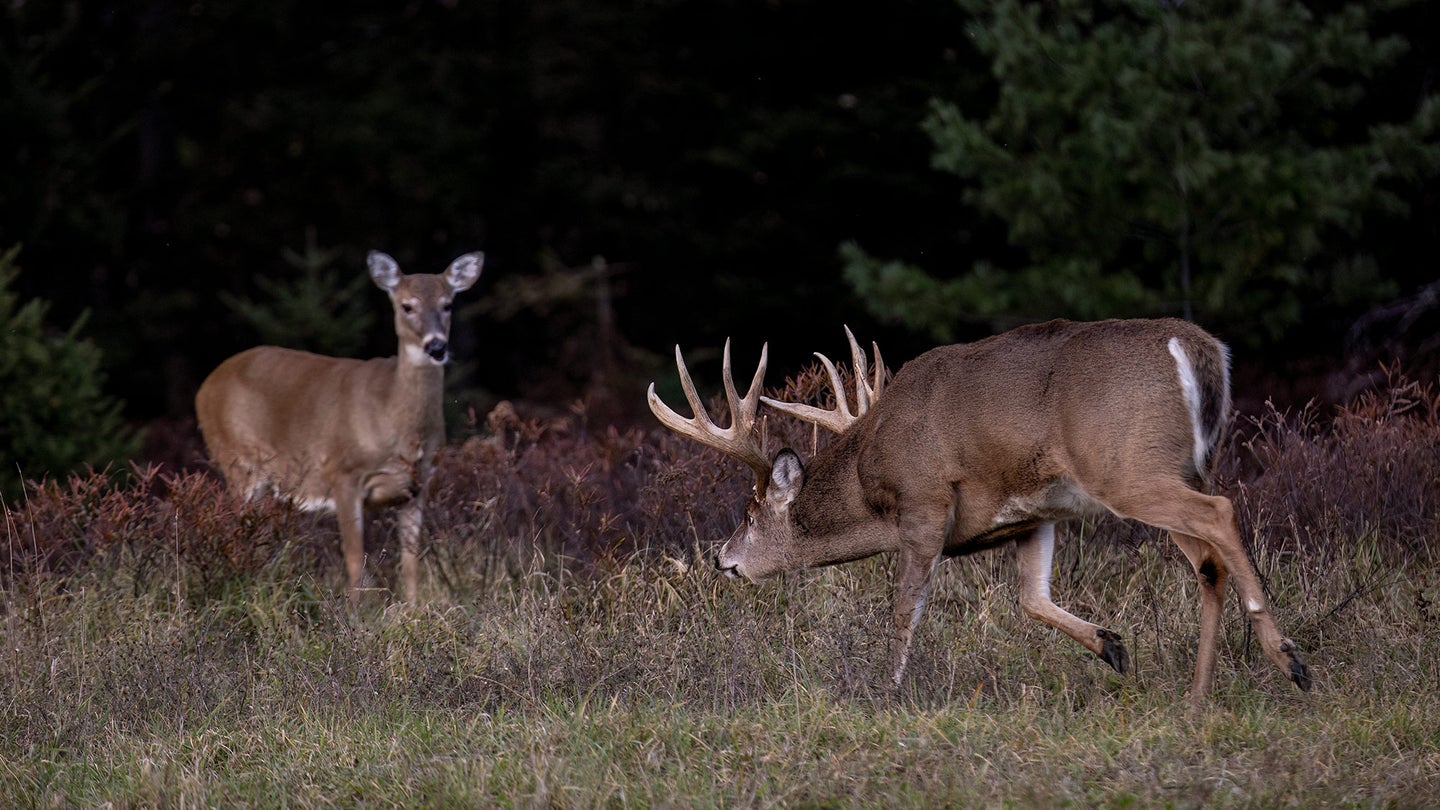The Standoff: A Dream Hunt in the Whitetail Woods

I WASN’T going to shoot either deer. Nor did I want to risk spooking one and send it huffing and puffing through the deep woods just as my hunt got started. So I eased the rifle down, leaned against the tree, and watched from my stand.
The young doe had emerged first, from straight behind me. I could hear her crunching acorns. By the time I twisted around to see what was shuffling toward me, she was only 15 feet away. I froze. It’s one of the things I like most about a simple, open ladder stand or climber: If you stay still and if you stay quiet, you’re sometimes rewarded with an intimate perspective into the life of a deer.
The doe kept looking over her shoulder, so I kept studying the woods in that direction. Suddenly, a small 8-point buck materialized on the path 30 yards behind her. I never saw that deer coming. It was as if the ground had opened up and spat him out. He wasn’t there, and then there he was. I marvel at how deer accomplish.
So now we were a threesome. The doe stared at the buck. The buck stared at the doe. I watched them both. And no one moved, not even to shuffle hooves or feet, for a solid 20 minutes.
The Plot Thickens
I’m not much of a horn hunter. For many years, I was more interested in Boone and Crockett–worthy backstraps than headgear, so I’d shoot the season’s first few decent does that showed up and move on to ducks. Then I started hunting a buddy’s farm where there were good bucks—and more than one or two. I started holding my fire, and what showed up was all the grandeur of watching deer chase and run and primp and fight. And what showed up was the grandeur of deer chasing and running and primping and fighting. If you shoot the first you see, you miss out on seeing the pageantry of the whitetail woods. It took me longer to learn that than it should have.
When a deer knows something’s up, it turns its every sharp sense toward you and dares you to twitch. It’s an electrifying sort of rush, to be under that kind of scrutiny.
In the deep woods, my showdown with the two deer dragged on long enough that my legs started to cramp, so I uncorkscrewed my torso and eased down toward the tree-stand seat, keeping the trunk between me and the deer. And that’s when the really serious buck spotted me—from 80 yards deeper in the woods—and snorted like a Lab with a snout full of Cajun spice. I froze again, doing a wall sit on the back of the tree, and tried to figure out my next move. I knew the larger buck was staring right at me. I also knew that the first two deer hadn’t budged. Now there were four of us, in varying stages of high alert.
Sooner or later, I had to sit down, albeit slowly, and when I did, I heard the larger buck crash through the brush. He was no fool.
I figured the other two deer had to be looking his way, so I stood up and turned back around. Sure enough, the doe and smaller buck were fixated on Big Boy’s ruckus. But he hadn’t busted away, after all. Instead, he had closed the distance, pulling up 30 yards short of the trail, in full view of everybody, as if to say, Enough horsing around. Let’s get this party started.
Now the doe was looking at the little buck who was looking at the big buck who was looking at all of us. Showdown No. 2 commenced.
The Final Act
These face-offs—when you and a deer are aware of each other, but without enough particulars for either party to make a move—are some of the most exciting moments I have had in the field. So much of what pulls me to the deer woods is the chance to peel back the curtain that separates my world and the natural one. Penetrating a deer’s defenses, and moving undetected into the world it inhabits, is a thrill, no doubt. But there’s something exhilarating about those few minutes after you’ve tipped your hand—or stepped on a stick. When a deer knows something’s up, it turns its every sharp sense toward you—ears pricked and swiveling, nostrils flaring, feet stamping—and dares you to twitch. It’s an electrifying sort of rush, to be under that kind of scrutiny. The deer senses the curtain ruffle, and suddenly a few million years’ worth of predator detection is focused on your camo-clad silhouette. I close my eyes halfway. I try to emit neutral vibes, repeating a mantra in my head: I am a bush. I am a boulder. I am nothing to worry about.
In the woods, my close encounter continued. The larger buck was trying to take stock of the situation. He knew I—or something—was there, but the young doe and adolescent buck trumped any concern. He stomped. He lip-curled. And in all this time, the doe and the smaller buck didn’t move a muscle.
Suddenly, the big buck had had enough. Without warning, he charged the little buck, head down and coming hard.
I don’t know what happened to the doe. Nor to the little buck, for that matter. I just know that my rifle was coming up the split second the big 9-pointer broke my way. Because as soon as he crossed the centerline of the path, he was on my side of the property line. And I aimed to win this standoff.
Read more F&S+ stories.
The post The Standoff: A Dream Hunt in the Whitetail Woods appeared first on Field & Stream.
Articles may contain affiliate links which enable us to share in the revenue of any purchases made.
